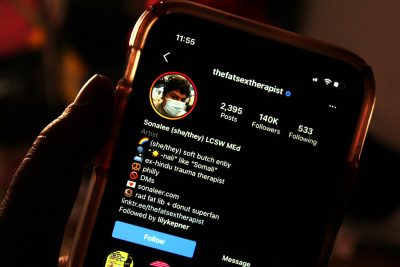Amid the pandemic, bustling news cycle and Spring Recess-free semester, meaningful connections and self-care are extremely important for Boston University students, yet challenging to pursue.

Sonalee Rashatwar, popularly known by her Instagram handle “TheFatSexTherapist,” presented an interactive workshop on fatphobia, body wisdom and personal care at an event held by the Community Service Center, Sexual Assault Response and Prevention Center and Queer Activist Collective Thursday.
Gladys Vargas, a junior in the College of Communication and the empowerment league program manager for the CSC who organized the event, said she has been a long-time Instagram follower of Rashatwar and wanted to host them at BU after being inspired by their content.
Vargas said the event, titled “Radical Rest: A Creative Educational Workshop with Sonalee Rashatwar,” was particularly timely given the absence of a Spring Recess and students’ increased need for self-care as a result.
“Something like this, something that’s radical, something that affirms that we’re all from different communities of marginalization experiencing the pandemic in a different way,” they said in an interview. “I felt like that was a more affirming and engaging and helpful way to rest.”
Vargas also said the workshop was a space for growth.
“It was a calm space for learning, discussion, reflection on our own biases and the things that we’ve been taught from our culture in America,” they said.
During the event, Rashatwar shared her personal experiences and insights as a clinical social worker, adjunct lecturer, sex therapist and grassroots organizer on how fatphobia and policial marginalization manifested in her life and in the culture around her.
“I am someone who decided to transform my pain into art,” Rashatwar said at the event. “So that hopefully no kids grow up with the kind of fat trauma that I experienced.”
At the event, they also spoke about how a world cannot be rid of fatphobia without also addressing other societal discrimination, white supremacy, ableism, anti-Blackness and Islamophobia in the country.
Rashatwar co-owns Radical Therapy Center, which they describe as a small Philadelphia-based practice composed of queer and trans clinicians of color primarily working with queer and trans persons of color. The center offers support for individuals on topics including sexuality, body image and racial identity, and works to help clients address interpersonal and socio-political issues holistically.
At the event, Rashatwar said their practice aims to move away from “white supremacist-centered understandings of healing,” to a more inclusive healing approach.
Rashatwar moderated an open discussion on a variety of topics, which involved a “fatphobia litmus test” and open-ended writing and art exercises for participants to reflect. She used examples from social media to illustrate how fatphobia is “intentionally wrapped up in misogyny and desirability” and used to devalue people.
“Being aware of how our body and our capacity to work on our health will change over a lifetime does way more to a practice of self-compassion, self-forgiveness and self-love,” they said at the event. “Maintaining our health is actually a lot more about performing class status.”
They also noted that fatphobia is a subset of larger social issues such as classism and racism.
For example, she showed a tweet comparing white supremacy to high fructose syrup, demonstrating how diet culture and capitalism have “demonized” different macronutrients throughout the years for profit. In the last three decades, Rashatwar said it has shifted from fat to carbs to gluten and sugar.
Savannah Majarwitz, a junior in the College of Arts and Sciences who attended the event, wrote in an email the individualized nature of health can make definitions toxic even if they are well-meaning. She noted how, growing up, she received comments about her eating that were meant to be about her health but were actually very hurtful and negative.
“The way my family has defined health has always been centered on moralizing food and on the suggestion of restrictive eating intakes,” she wrote in an email. “This mingled with how doctors and overall society tends to view health has contributed a lot to my own internalized fatphobia. I constantly overthink what and how much I should be eating on a daily basis.”
Majarwitz wrote that events like Thursday’s workshop are helpful for determining what stigmas still exist and how people can overcome them — she still sees flaws in the systems around her, such as how her doctor would always ask her about losing weight like it was “only option” for her body type.
“This here just shows again another example of how fatphobia exists in societal structures and we have to be aware of how problematic this is as a norm,” Majarwitz wrote in an email. “At the end of the day, health should never be moralized.”
COM senior Ciel Tatoyan wrote in an email she found the event “healing” — adding it was a highlight of her week. At the event, she wrote that she spoke about the fear that cisgender, heterosexual men will be uninterested in her because of her weight or fetishize her, and the event was helpful in releasing these feelings.
“As a fat person, I often fear that my fatness affects how people see and interact with me, particularly in a romantic sense,” Tatoyan wrote. “I loved everyone’s responses to what I said … Sonalee was super helpful.”
At the event, Rashatwar suggested people think of their body as a mark of their ancestral lineage and a helpful tool for self-love, though she acknowledged this may not be a strategy that could be helpful for everyone.
“I like to be able to think of my body as something that I inherit, like an heirloom, that’s passed down from generation to generation,” they said. “It’s a gift. We don’t criticize it. Every ding, scratch, scrape is supposed to be on that heirloom because it survived something, it’s resilient.”



















































































































